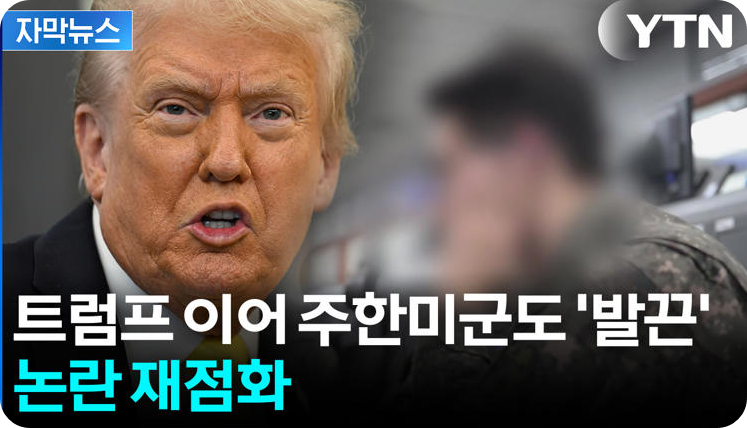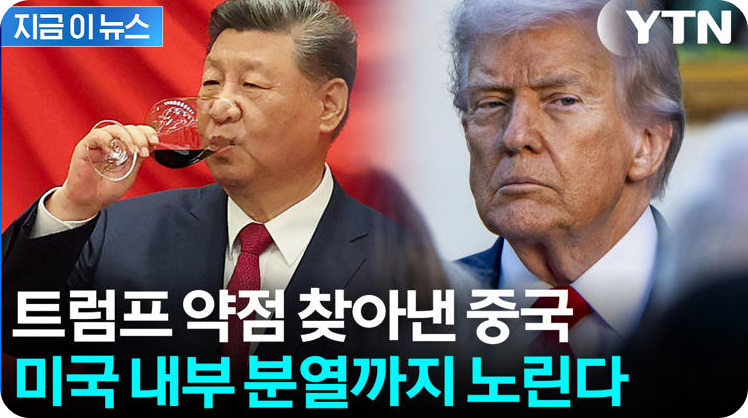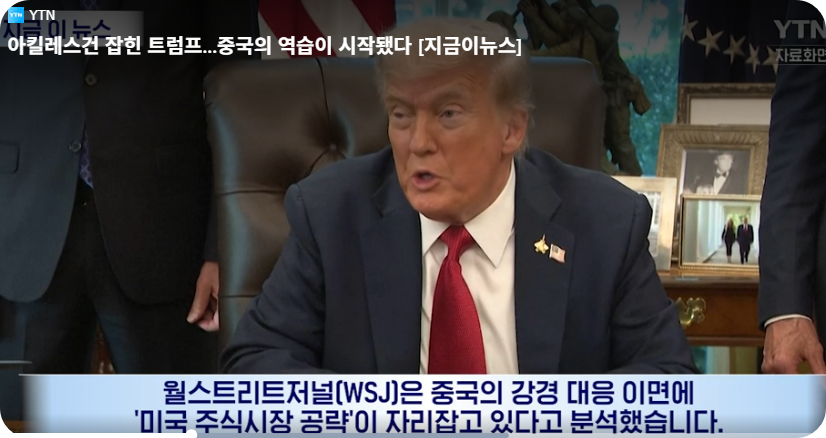트럼프의 ‘경제적 강압’ 전략이 불러온 역풍과 고립의 징후

미국이 늘 하듯, 강한 목소리로 중국의 희토류 통제를 비판하며 동맹국을 압박하지만, 이상하게도 **“이중 잣대”**라는 비판만이 되돌아온다.
트럼프 정부의 무차별 관세와 제재는 동맹국들마저 고개를 돌리게 만들고 있다.
이대로라면 그의 ‘경제 전쟁’은 동맹국들과의 갈등을 넘어 고립의 길로 이어질지 모른다.

오늘 주제에 맞는 성경 말씀
“공의는 높은 곳에서 비친다. 낮은 곳에서는 공허하다.”
─ (잠언 16:12)
공의와 정의가 높은 자리에서만 주장된다면, 진정한 도덕성과 일관성은 사라진다.
강압과 압박으로 일관하는 외교는 결국 진정한 신뢰를 거두지 못한다.
요담과 아하스, 서로 다른 두 왕의 길
요담과 아하스, 서로 다른 두 왕의 길 -역대하 27:1 – 28:15삶의 방향은 신앙의 뿌리에서 결정됩니다. 요담과 아하스, 두 왕의 이야기는 같은 가문에서 태어났음에도 완전히 다른 길을 걸은 두 인
iallnet12.tistory.com
1. 트럼프의 ‘중국 비판’과 동맹국의 미묘한 거리 두기
트럼프 정부는 중국의 희토류 수출 통제를 두고 “공급망 무기화”라며 강하게 비판했고, 동맹국들과의 연대를 강조했다.
그런데 정작 중국도 즉각 반박하며, “미국이 그동안 해온 관세·제재가야말로 전형적인 이중 잣대”라고 맞섰다.
미국이 비판하던 방식들이 지금 돌아보면 미국 자신에게도 그대로 적용된다는 지적이 설득력을 얻고 있다.
동맹국들의 반응도 미온적이다. 과거 미국이 고율 관세를 부과해 한국·일본·EU 등이 직격탄을 맞았던 경험이 있다.
이 기억은 “미국이 그런 말을 할 자격이 있나”라는 회의로 이어진다.
이제 동맹국들은 더 이상 미국의 주장만 편들지는 않을 것 같다.

2. 과거 관세 전쟁의 기억
트럼프 정부는 자동차, 철강, 의약품 등 다방면에서 관세를 부과하며 자국 산업 보호를 명분으로 삼았다.
이로 인해 한국·일본·유럽 등 주요 교역국들이 불만을 드러낸 것은 이미 수차례다.
인도가 러시아산 원유 수입을 문제 삼자 50% 관세를 부과하자, 인도 내부에서는 “미국도 러시아와 교역하면서 왜 우리만 문제 삼느냐”는 거센 비판이 나왔다.
이런 과거의 상처들이 지금 미국의 비판이 설득력을 잃게 만드는 배경이다.
미국이 주장하는 ‘경제적 강압’이나 ‘공급망 무기화’라는 표현이, 사실은 그동안 미국의 무역 정책에도 동일하게 적용된다는 지적이 나올 만 하다.

3. 국제사회가 ‘왕따’ 위기를 느끼는 이유
첫째, 외교적 신뢰의 위기다.
정책이 일관되지 않고 예측 불가능하다는 인식이 쌓이면, 동맹국들은 미국의 말이 얼마나 진정성 있는지 의문을 가진다.
둘째, 규범과 제도 중심 외교체계에 대한 도전이다.
미국이 WTO 규범이나 자유무역 원칙을 무시하거나 위반하는 행동을 반복하면, 국제 무대에서 도덕적 우위는 사라진다.
셋째, 대안 진영의 부상이다.
중국은 “공급망 통제는 규범 내 조치”라며 방어하고, 일부 국가들은 미국에 기대기보다는 다극 외교, 신흥 경제권과의 협력 확대 쪽으로 방향을 돌리는 듯하다.
![도널드 트럼프 [사진=AP=연합뉴스]](https://blog.kakaocdn.net/dna/czkVjS/dJMb9eF5BKs/AAAAAAAAAAAAAAAAAAAAAFDOm6K7dENK8G6m6FLqmxYH9vu-Fykgwnj4-moXwb9g/img.png?credential=yqXZFxpELC7KVnFOS48ylbz2pIh7yKj8&expires=1774969199&allow_ip=&allow_referer=&signature=8rclHLmLfrF0b%2BF6Nn5B7KkUlkA%3D)
4. 그럼에도 미국이 포기할 리 없는 전략
미국은 산업 경쟁력 약화, 무역 불균형, 기술 주도권 상실 등 현실적인 위기 요인들을 무시할 수 없다.
그래서 경제를 ‘무기화’ 하며 외교적 압박을 강화하는 것이다.
하지만 그 방식이 오래 지속 가능할지는 미지수다.
미국 내에서도 비판의 목소리는 끊이지 않는다.
전략이 과도하게 공격적이라 동맹들을 소외시키고 오히려 반발만 키운다는 견해가 많다.
![트럼프의 ‘경제적 강압’ 전략이 불러온 역풍과 고립의 징후, [사진=YTN 자막뉴스]](https://blog.kakaocdn.net/dna/0YSvC/dJMb862mqqR/AAAAAAAAAAAAAAAAAAAAAN1ESHzVFkeX5ZaH7cwPPEju8u9Lv7025qB0sF9uTxBq/img.png?credential=yqXZFxpELC7KVnFOS48ylbz2pIh7yKj8&expires=1774969199&allow_ip=&allow_referer=&signature=kJJmCYE%2F39n9uA4Z7H2vOwRgoCM%3D)
5. 한국과 동아시아의 선택지
한국은 미국과의 안보 동맹이 있지만, 동시에 중국 및 아시아 지역과의 경제적 연결 고리도 깊다.
미국 편을 들다 중국과 경제 마찰이 커진다면 손해가 클 수 있다.
따라서 한국은 신중한 외교적 균형 감각을 유지해야 한다.
또한 동아시아 국가들은 서로 연대 가능성이 높다.
미국의 일방적 압박을 상쇄할 힘은 동맹 네트워크 강화와 외교적 다변화에 있다.
마무리
트럼프 정부의 강한 어조와 압박 전략이 역풍을 맞고 있다.
동맹국들이 이중 잣대와 불투명한 정책에 거리감을 두고, 국제사회는 미국을 향해 싸늘한 시선을 보내고 있다.
미국 스스로가 주장한 ‘경제적 강압’의 프레임은 이제 미국의 행보에 그대로 되돌아가고 있다.
미래의 국제 무대는, 압박보다 신뢰와 규범을 기반으로 한 리더십이 더 빛날 것이다.
서민들 피눈물 흘리는데 “은행까지 한패였다고?” 이젠 뿌리 뽑자!!
서민들 피눈물 흘리는데 “은행까지 한패였다고?”전세사기 피해자들의 울분은 단순한 개인의 비극이 아니라, 시스템이 무너진 사회의 초상이다.그런데 이번에는 충격적으로, 국민이 신뢰했던
iallnet.com
출처
- Reuters, “China blames US for global panic over rare earths controls”
- Council on Foreign Relations, “Geopolitics of Trump Tariffs”
- 기타 국제 언론 및 분석 기사
◆ View the English translation. Click below.
Trump’s “Economic Coercion” Strategy Bounces Back—and Risks Isolation
Just as America often does, Trump criticizes China’s rare earth export controls in strong terms and pressures allies to join him. Yet what returns is not support, but criticism of “double standards.”
Through sweeping tariffs and sanctions, his administration has alienated even its once-loyal allies.
If this continues, his so-called “economic war” might lead not to victory—but to isolation.
Bible verse that fits today’s topic
“Justice is high, but the Lord regards the lowly; the proud He knows from afar.”
─ (Psalm 138:6, paraphrased)
If justice is only proclaimed from a height but never practiced toward the humble, true consistency and integrity vanish.
A diplomacy based on coercion will ultimately earn no genuine trust.
1. Trump’s Criticism of China Meets Allies’ Quiet Distance
The Trump administration labels China’s rare earth export controls as “weaponizing supply chains,” urging alliance solidarity. China, in turn, swiftly rejects that narrative, accusing the U.S. of applying exactly the same double standards.
Some allies now question whether America even has moral ground to criticize in this domain.
Responses from traditional U.S. allies have been lukewarm. Having suffered from past tariff policies—on automobiles, steel, pharmaceuticals—they recall bitter lessons. They now treat U.S. criticism with a grain of skepticism.
2. Memory of Previous Trade Wars
In previous years, Trump imposed tariffs across critical sectors—autos, steel, pharma—purportedly to defend American industries.
Those tariffs struck Korea, Japan, the EU, and others directly.
When India bought Russian oil, the U.S. imposed a 50% tariff, prompting Indian leaders to ask: if the U.S. and EU also trade with Russia, why single out us? The outcry was loud and swift.
These historical wounds make it harder for current U.S. criticisms to land credibly.
When America invokes “economic coercion” or “weaponized supply chains,” observers see these terms as reflecting U.S. practice rather than aspiration.
3. Why the World Senses a ‘Pariah’ Trajectory
First, trust is eroding.
When policies are erratic and unpredictable, allies start to doubt whether America’s commitments are real or transactional.
Second, norms and institutional diplomacy are under strain.
Repeated U.S. violations or circumventions of WTO rules diminish the moral authority of its critiques.
Third, rival poles are gaining traction.
China now defends its export controls as normative, and some countries are pivoting toward multipolar diplomacy and diversifying beyond U.S. dominance.
4. Yet the U.S. Sees Itself with Little Room to Retreat
From the American perspective, the pain of deindustrialization, trade deficits, and technological competition is very real.
Hence, the logic of weaponizing trade is understood—even if risky. But whether it’s sustainable in the long-term is doubtful.
Even within the U.S., critics warn that an overly aggressive stance risks isolating America and undermining alliances that could otherwise support its strategic goals.
5. Choices for Korea and East Asia
Korea, bound by security ties with the U.S., also has deep economic integration with Asia, including China.
A full tilt toward America could provoke economic backlash; yet attempting neutrality invites pressure from both sides. Wise statesmanship demands balance.
East Asian states may find strength in coordination—pooling influence, deepening intra-regional ties—to blunt unilateral pressure from any one external power.
Conclusion
Trump’s hardline tactics are generating mounting backlash.
Allies are recoiling at perceived double standards, and global audiences are watching warily.
The very labels—“economic coercion,” “supply chain weaponization”—once used to indict China now reflect back on U.S. policy itself.
In the coming era, influence will favor those who lead with principles and trust, not threats.
Source
- Reuters, “China blames US for global panic over rare earths controls”
- Council on Foreign Relations, “Geopolitics of Trump Tariffs”
- Various international media and analysis
#Trump, #rareearths, #tradewar, #economiccoercion, #allyreaction, #doublestandard, #internationalisolation, #tradepolicy, #KoreaDiplomacy, #AsiaStrategy
끝까지 읽어 주셔서 감사합니다.
◆ 제 다른 글 소개
“술 따르라” 지시에 뺨으로 응답한 여배우
“술 따르라”는 감독에게 따귀 날린 배우 박준금, 권위에 맞선 용기의 상징 1980년대 연예계는 지금으로선...
blog.naver.com
스타가 전하는 하루 설계법
중년에도 청춘처럼, 송혜교·하지원·손태영이 말하는 ‘저속노화 라이프’ 비밀 나이가 들어도 활력 있고 건...
blog.naver.com
'유익한 정보 좋은 글' 카테고리의 다른 글
| 이강인, PSG의 구세주가 되다 – ‘골든보이’의 감각적 패스가 만든 극적 무승부 (4) | 2025.10.18 |
|---|---|
| 유전자가 빚어내는 잔혹한 춤, 마음과 몸을 무너뜨리는 질병의 실체 (7) | 2025.10.18 |
| 서민들 피눈물 흘리는데 “은행까지 한패였다고?” 이젠 뿌리 뽑자!! (3) | 2025.10.17 |
| 한국 탁구, 혼성단체 월드컵 출사표 — 장우진·신유빈 중심으로 펼쳐질 도전의 새 장 (3) | 2025.10.17 |
| 이요원, ‘살림남’ 새 MC로 합류 -배우에게도 새 길을 열다 (6) | 2025.10.16 |


